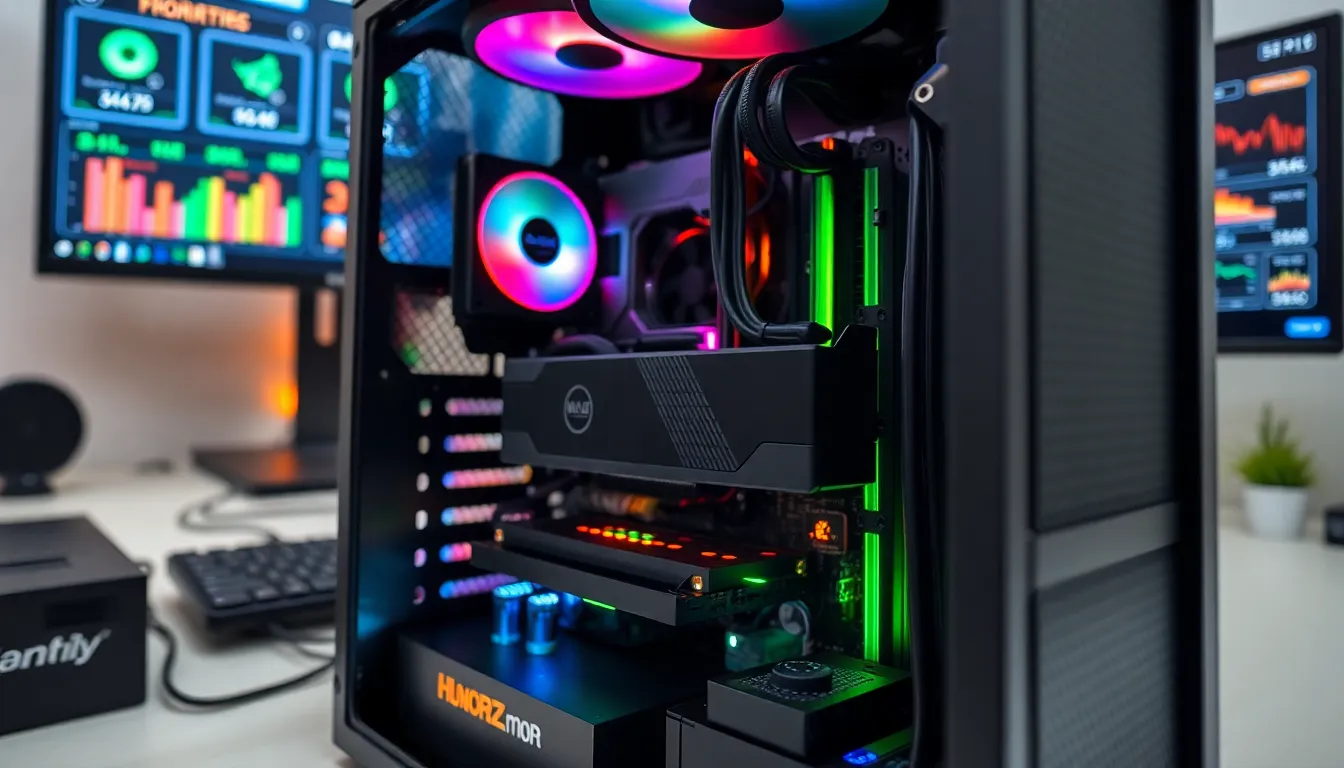In the ever-evolving world of technology, keeping your PC up to date can feel like a game of whack-a-mole. Just when you think you’ve got the perfect setup, a new graphics card or faster SSD pops up, demanding attention. Enter the PC hardware upgrade scanner—the trusty sidekick every tech enthusiast didn’t know they needed. It’s like having a personal trainer for your computer, but without the sweat and awkward small talk.
Imagine effortlessly identifying which components are lagging behind while your friends are bragging about their lightning-fast rigs. This handy tool not only saves time but also helps users avoid the dreaded “what did I just buy?” syndrome. With a few clicks, they can ensure their system runs like a well-oiled machine, ready to tackle anything from gaming marathons to intense video editing. So, why not give your PC the upgrade it deserves?
PC Hardware Upgrade Scanner
PC hardware upgrade scanners function as essential tools in maintaining a computer’s performance. These scanners analyze existing hardware, helping users understand what components need upgrades based on current and emerging technology.
What Is a PC Hardware Upgrade Scanner?
A PC hardware upgrade scanner is a software application designed to evaluate system components. This tool examines parts such as the CPU, RAM, graphics card, and storage devices. By providing a comprehensive report, users can see areas where upgrades are necessary. Scanners often include recommendations on compatible hardware, simplifying the upgrade process.
Importance of Using a Scanner for Upgrades
Utilizing a scanner for upgrades enhances the efficiency of hardware management. Identifying outdated components allows users to make informed decisions regarding replacements. Scanners help avoid compatibility issues, ensuring new parts work with existing systems. Upgrading hardware based on scanner reports results in improved performance for gaming, video editing, and multitasking. Leveraging this technology saves time and reduces stress while optimizing overall system efficiency.
Key Features of PC Hardware Upgrade Scanners

PC hardware upgrade scanners provide essential tools for optimizing system performance and ensuring compatibility with new components. Their key features include compatibility checks and performance analysis.
Compatibility Checks
Compatibility checks assess system components against potential upgrades. Scanners analyze CPU, RAM, and motherboard specifications. They identify parts that fit within the system’s architecture, preventing errors during hardware installation. Updated databases contain manufacturer specifications, so users receive accurate recommendations. Checks minimize risks associated with purchasing incompatible hardware. Users easily view compatibility statuses through user-friendly interfaces, simplifying decision-making.
Performance Analysis
Performance analysis evaluates existing hardware capabilities and suggests improvements. Scanners benchmark current CPU, RAM, and GPU performance metrics. Detailed reports highlight bottlenecks, providing insights on necessary upgrades. Real-time data allows users to gauge impacts of potential changes on overall system efficiency. Enhanced recommendations cater to specific uses, such as gaming or graphic design. Users benefit from optimized configurations tailored to their unique needs.
Popular PC Hardware Upgrade Scanners
PC hardware upgrade scanners offer essential functionalities for optimizing computer performance. Users rely on these tools to identify outdated components and make informed upgrade decisions.
Top Recommendations
- PCPartPicker: This tool combines compatibility checking with a user-friendly interface, allowing users to create customized build lists.
- Speccy: Speccy provides detailed insights into system specifications, offering quick access to hardware details before considering upgrades.
- Crucial System Scanner: Users appreciate this scanner for its focus on memory upgrades, making it easy to find compatible RAM for efficiency.
- HWInfo: HWInfo excels at delivering in-depth performance metrics and real-time data, aiding in the assessment of current hardware capabilities.
- UserBenchmark: This platform helps users compare their system’s performance against similar builds, highlighting specific areas for improvement.
Comparisons of Features
Comparative analysis highlights variations among popular scanners. Compatibility checks in PCPartPicker ensure that selected components work together seamlessly. Speccy places an emphasis on detailed system insights, offering a broader view of performance aspects. Crucial System Scanner specifically targets memory upgrades, simplifying the process for RAM selection. With HWInfo, users benefit from continuous monitoring and data logging, enhancing analysis capabilities. UserBenchmark provides a community-driven approach, facilitating benchmarking comparisons to understand user performance expectations thoroughly. Each scanner presents unique features, catering to diverse user needs in hardware upgrades.
How to Use a PC Hardware Upgrade Scanner
Using a PC hardware upgrade scanner streamlines the upgrade process, ensuring users find compatible components easily. Follow these steps for an effective experience.
Installation Process
To begin, choose a preferred scanner from the recommendations. Download it from the official website or a trusted source. Installation typically involves running the executable file and following the on-screen instructions. After installation, launching the application presents a user-friendly interface, guiding users through the scanning process. Users may need administrative privileges, so grant necessary permissions when prompted. Once set up, the scanner analyzes system specifications, identifying any outdated hardware components.
Interpreting Results
Interpreting the results from the scanner is straightforward. Typically, the application generates a detailed report listing all identified components and their current status. Users can see recommendations for upgrades, ranked by priority based on compatibility and performance. Look for alerts indicating non-compatible parts, as these highlight critical issues. The performance analysis section often benchmarks current hardware against standard metrics, providing insights into potential improvements. Understanding this data enables users to make informed decisions about upgrades tailored to their specific needs, enhancing overall system performance.
Conclusion
Utilizing a PC hardware upgrade scanner can significantly streamline the process of optimizing computer performance. By identifying outdated components and providing tailored recommendations, these tools empower users to make informed decisions about their upgrades. The ability to check compatibility and analyze performance metrics ensures that each upgrade aligns with specific needs, whether for gaming or professional tasks.
In a rapidly evolving tech landscape, leveraging these scanners not only saves time but also enhances overall system efficiency. With various options available, users can find a scanner that fits their requirements, ultimately leading to a more powerful and capable PC.


More Stories
Bundling with PC Components: The Secret to Easier Builds and Big Savings
What Is Hardware? Discover Its Essential Role in Modern Technology
PC Hardware Little Rock: Uncover the Best Components for Gamers and Creators